Your baby’s first birthday will be a significant and
emotional milestone for you and may trigger mixed feelings. The past 12
months will have been life changing and it is quite normal to feel a few
pangs as you put away the baby clothes and start to look forward to
your child’s next phase of development.
“He may seem more independent, but your toddler needs you more than ever, to stay calm, set him boundaries, and encourage him.”
“This is a lovely period
of child development, and I hope you are able to enjoy it to the
fullest. Don’t feel you need to force physical development in any way.
That will all happen naturally and in good time.”
Becoming more
mobile and developing language skills will dominate the next 1–2 years
as your baby leaves infanthood behind and enters the brave new world of
independence and communication.
He will start to
experience strong feelings at this age, but will not yet have the
ability to manage them so you will need to help him. The way you respond
to your child over the months ahead will have an influence on
longer-term social development. The emphasis should be on loving,
nurturing, encouraging, and reassuring your child as he crawls, wobbles,
toddles, and tumbles his way to mastering and enjoying his newfound
mobility, and gradually builds a repertoire of skills that allows him to
get about and communicate his needs more effectively.
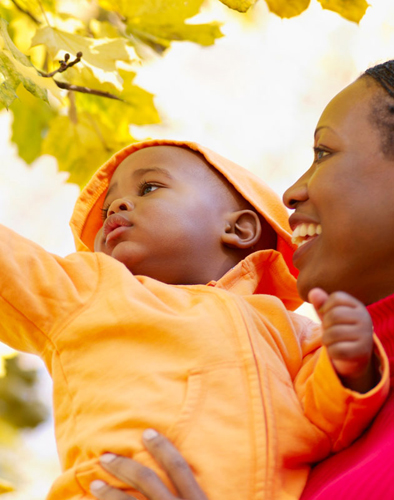
Difficult times
As your child struggles to make sense of her world, she will look
to you for help. The more frustrated she becomes, the calmer and more
patient she needs you to be.
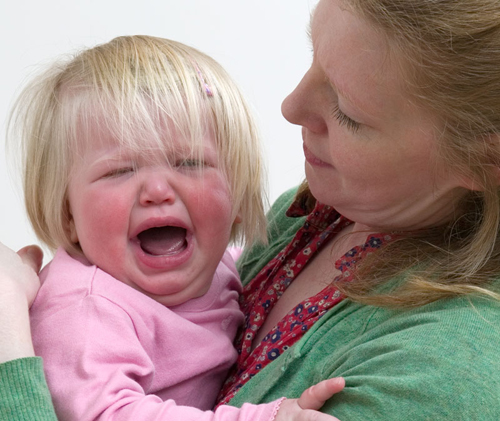
Brain power
These early months are vitally important for healthy brain development,
and the way your child experiences the world during his second year of
life will have a significant impact on his emotional development, as
well as his learning and thinking skills. Children of this age need to
know that the person who cares for them is emotionally available, can be
trusted, and won’t cause them harm. Incredible though it may seem, your
child is already absorbing emotional messages from his environment that
will contribute substantially to his later social skills and emotional
intelligence.
You will soon need to
start putting in place some clear behavioral guidelines and boundaries,
but for the next six months behavior management revolves more around
using distraction techniques. One of the biggest challenges for you
during the next two years is to make sure that praise and encouragement
are used frequently and that the word “No” does not dominate. Along with
being given the core basics of food, warmth, and a safe place to be
himself, your child needs love and comfort, and to develop confidence.
These are the important ingredients for healthy development. A child who
feels loved and safe will develop greater levels of self-esteem and
will feel more secure—so remember to show your child how much he is
loved and give him plenty of praise.
Pile on the praise
Your toddler’s sense of self-belief develops from the feedback he
receives from you. So praise all his attempts at new skills, even if he
fails.
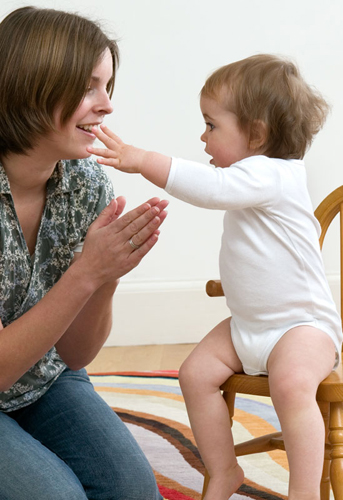
Short-term memory
Your toddler has
little capacity for common sense and his memory has not yet developed
sufficiently to retain information for long. You will have to repeat the
most basic instructions, and may be surprised that your otherwise alert
child can’t seem to grasp the fact that if one electrical outlet is
dangerous, then all outlets are dangerous. Be reassured that this is
normal behavior for this age.
Your toddler will be
interested mainly in you—and how you respond to his needs. He will be
well attuned to your expressions and responses, the way you talk, the
way you smell, the way you hold him, and whether you are tense or
relaxed. Months 12–18 are about beginning to learn the skills that will
help him with personal understanding and sociability when he is older.
As his senses and spatial awareness become more sophisticated, your
toddler’s memory will improve. He will be able to figure out, “If I
stand here, I can reach there”, and will remember, for example, what his
fruit drink smells like. This is because the senses provide memory
triggers that speed up recall. This recall will develop more rapidly
from months 19–24, but the seeds are being sown now via your child’s
growing interest in, and ability to explore, his environment. By the age
of two his senses will be fully developed, although the ability to
interpret the simultaneous messages that they deliver will develop more
gradually and through experience.
New skills
The primary areas of
development at this stage are learning to walk, learning to talk, and
learning about feelings. While at 12 months your little one is likely to
be quite shy with strangers, by 18 months there will be definite signs
of toddler independence—although you will still be the central focus in
your child’s world.
In terms of physical
development, the gross motor skills that drive large movements will
strengthen to a point where a toddler will begin to learn to sit up,
stand, crawl, and begin to walk. The fine motor skills, which drive the
smaller movements of the body, will develop so that you will notice your
child is able to pick up small objects by using his thumb and index
finger (awkwardly to begin with); can point enthusiastically at anything
of interest; can drop and throw things; and will start to build with
blocks and learn to scribble. As he starts to develop new muscles and
lose baby fat, you will begin to see physical and facial changes as he
starts to look less like a baby and much more like a child.
Signs that development is on track
It is important to emphasize that all children will develop at their own pace, and rarely in a steady upward line (see What is Normal and When to Worry). The following is an approximate guide to how new skills will develop.
By the end of 12–15 months, your child:
Can stand for a few moments without support.
May be able to toddle a few steps without help.
Can drop and throw toys deliberately.
May be starting messy self-feeding with fingers or spoon.
Can pick up small objects using pincer grip (thumb and index finger).
May be able to say two or more words.
By the end of 16–18 months, your child:
May be able to walk steadily and may be starting to do so “heel first.”
May be able to walk up steps or run.
Can kneel without support.
Can squat and then stand up.
Can recognize familiar people at a distance.
Can point at things he recognizes.
May be able to say 3–6 words.
What is Normal and When to Worry
Many parents—especially
first-time parents—worry about their toddler’s behavior, as well as the
rate at which developmental milestones are reached. It can help to be
aware of what is within the normal range and to know when and where to
seek advice.
While many of the concerns you have about your child may be unfounded (see Common concerns (Ages 1–3)),
it’s important to air them if you are worried. Talk to your
pediatrician for advice, ask the staff at your preschool (if your child
attends one), and discuss any concerns with other parents. However, try
not to get caught up in competitive parenting and remember that parents
may sometimes exaggerate their own children’s behavior and progress. If
your child’s temperament seems similar to your own, you may expect him
to behave in a certain way. Keep an open mind and try not to make
assumptions about how he might behave or which skills he will learn
first.
Your anxiety—natural at
times—needs to be dealt with in a way that does not impact negatively on
your child or make him unsettled.
Early warning signs
There are certain key
developmental milestones that, if not met, may indicate cause for
concern. I can’t emphasize enough that all children develop at their own
pace. If you have any concerns, please do seek professional advice
rather than worrying in isolation.
Movement
Floppy,
poor muscle tone will show in a child’s inability to sit unsupported,
hold his head up, or push up on his arms. If your child is making no
attempt to pull himself up to stand and shows a chronic lack of interest
in moving, you may want to ask your doctor for an assessment of his
gross motor skills.
Learning to walk
Your baby’s first steps are a key milestone and cause for
celebration. Remember, the age range for starting to walk is 10–18
months, and the timing bears no relation to athletic ability or
intelligence.
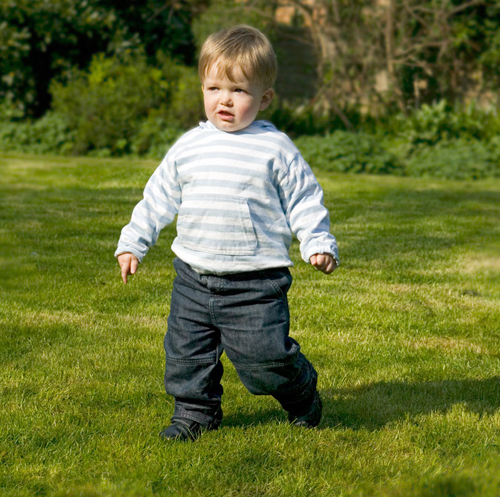
Remember:
Social skills
Poor
eye contact, lack of reciprocal smiles, not following a peekaboo game,
difficulty with sharing attention, not using skills such as pointing and
looking where someone is pointing may indicate difficulties with social
development.
Remember
Eating
Not maintaining or gaining weight, having reflux or allergies, never seeming hungry, should be investigated by a doctor.
Feeding concerns
Mealtimes can all too easily become a battleground between you
and your child as she develops. Try to stay relaxed about feeding and,
remember, she won’t starve herself.
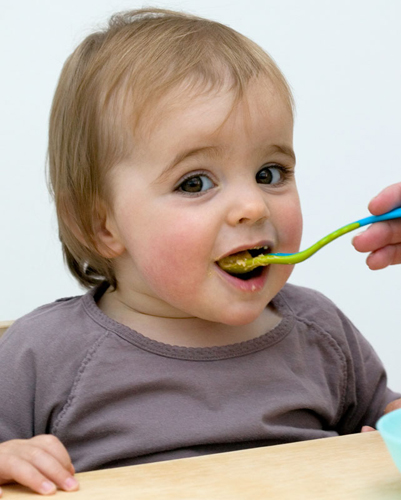
Remember:
Assessment
If you go to your
pediatrician with your concerns about your child, he or she may adopt a
“wait and see” approach initially. This is appropriate at this age since
children develop at different rates. It does not mean that they are not
interested. Do not hesitate to arrange to return to see your
pediatrician again if your concerns about your child’s health or
development continue.
It’s important to
always trust your intuition as a parent. If something does not feel
right, you are entitled to take action. There is a lot of emphasis on
early intervention now, so there are lots of services and support
networks to help you .
Common concerns (Ages 1–3)
None of the following behavior is a cause for concern, but you are not alone in worrying about it:
Disruptive, attention-seeking behavior when bored.
Overexcitement when there are visitors in the house.
Extreme messiness and inability to put things away.
Throwing things on the floor, especially food.
Resisting kisses, especially from those who are most likely to be offended!
The following statistics show how many other parents of toddlers wear themselves out with unnecessary worry:
50 percent worry that their child eats too little.
64 percent think their child eats the wrong kinds of foods.
52 percent said their child wakes up in the night.
70 percent reported difficulty in getting their child to bed.
68 percent worry that their child hits other children or takes things.
79 percent said that their child is clingy.
94 percent worry that their child constantly seeks attention.